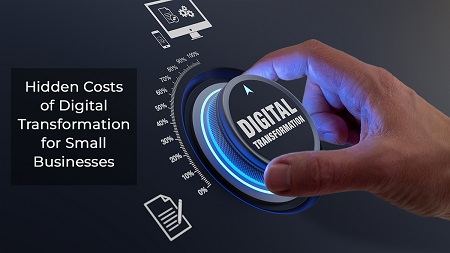Digital Platforms: What they are and how they create value
 As of 2025, over 70% of all global transactions are facilitated through digital platforms. That’s a huge shift from traditional commerce to a digitally-driven economy.
As of 2025, over 70% of all global transactions are facilitated through digital platforms. That’s a huge shift from traditional commerce to a digitally-driven economy.
In the early 2000s, the internet was primarily treated as a source of information – read articles, watch videos, and more. Today, digital platforms have made it possible to connect and facilitate exchanges between users from all around the world. If you want to succeed in the bustling business world today, mastering small business digital transformation is a grave necessity.
Defining digital platforms
Digital platforms can be defined as business models that use online infrastructures that help two or more user groups connect.
For example, Uber connects passengers with drivers, and Amazon links buyers with sellers. They do not have props of their own, like cars in the case of Uber and vast inventories in the case of Amazon. Instead, they provide the ideal environment in which the transactions between the two distinct user groups occur seamlessly.
Features of digital platforms
- Easy scalability
- 24/7 accessibility
- Streamlining of business processes
- Automation of complex tasks
- Minimized operational costs
Also Read: Top 5 Digital Platforms Every Small Business Should Use
Types of digital platforms
Choosing the right type of digital platform that benefits your business the most is the key to success.
Customer engagement platforms
Customer engagement platforms help create a connection between businesses and users. They provide personalized interactions through chatbots, AI-driven marketing, and Customer Relationship Management (CRM).
For example, HubSpot, a leading CRM platform, helps companies understand customers by helping track customer interactions, anticipate needs, and offer tailored solutions. Customer engagement not only promotes customer satisfaction but also boosts loyalty.
Data and analytics platform
The data and analytics platform involves collecting, processing, and analyzing vast amounts of data to help with strategic decision-making. With the help of these platforms, companies can leverage real-time analytics, predictive insights, and business intelligence tools.
Google Analytics is one of the most popular data and analytics platforms that is used by businesses of all sizes. It gives deep insights into website traffic, market performance, and customer behavior, helping brands know whether their strategies are working and if needed refine them.
Collaboration platforms
Collaboration platforms help business people keep in touch, especially in hybrid and remote work environments. These tools integrate messaging, project management functionalities, and file sharing, hence fostering teamwork and communication.
Slack, a popular workplace communication tool, can help streamline collaboration through channels, integrations, and real-time messaging with various productivity applications.
E-commerce platforms
E-commerce platforms provide the infrastructure for businesses to sell their products or services online. Inventory management, customer interactions, and payment processing are some of the many features provided by these platforms.
Shopify, a global player in the e-commerce software market, helps entrepreneurs and brands create online stores, manage transactions, and integrate marketing tools to drive sales and expand their reach.
Integration platforms
Connecting various applications, databases, and systems is important to enable smooth exchange and operational efficiency for businesses. Integration platforms help with this and also promote accuracy in data entry.
Zapier is an automation tool that connects different software like email, CRMs, and project management tools to streamline workflows without the need for complex coding.
How do Digital Platforms Create Value?
Network Effects
One of the most potent drivers of a platform’s value is the network effect. This phenomenon occurs when the platform’s value increases as more users join. For instance, the more sellers that list products on eBay, the more attractive the platform becomes to buyers, and vice versa. This self-reinforcing cycle can lead to exponential growth.
Reduced Transaction Costs
Digital platforms streamline processes that were once time-consuming and costly. By providing standardized protocols, secure payment systems, and user verification, platforms reduce the friction traditionally associated with transactions. This efficiency not only saves time but also builds trust among users.
Also Read: The Hidden Costs of Digital Transformation: How to Keep It Affordable for Small Businesses
Data-driven insights
With each interaction, platforms gather valuable data. This information allows them to refine their services, personalize user experiences, and even predict future trends. For example, streaming platforms like Netflix analyze viewing habits to recommend content tailored to individual preferences.
Innovation and Scalability
Platforms often provide the foundation upon which other businesses can build. Apple’s App Store and Google’s Play Store have empowered developers to create applications, fostering innovation and offering consumers a plethora of choices. This scalability means that platforms can grow rapidly without the constraints typical of traditional businesses.
LocalBizNetwork
Choosing the right digital platforms is crucial for businesses looking to improve operations and stay competitive. If you are looking to boost your online presence and reach your target audience, then LocalBizNetwork is the right choice. Apart from serving as a business directory, you can even showcase your business more profoundly through blogs, videos, and podcasts in your LBN business profile. Click here to learn more about the features that we offer.
Frequently Asked Questions
What are digital platforms?
Digital platforms are online systems that connect two or more user groups, enabling seamless transactions—like Uber connecting drivers with passengers or Amazon linking buyers with sellers.
How do digital platforms create value?
They create value through network effects, reduced transaction costs, data-driven insights, and by fostering innovation and scalability.
What types of digital platforms exist?
Key types include customer engagement platforms, data and analytics platforms, collaboration platforms, e-commerce platforms, and integration platforms, each designed to enhance different business functions.
Why are digital platforms important for businesses?
They enable global transactions, streamline business processes, and help companies reach broader audiences while lowering operational costs.
What are network effects in digital platforms?
Network effects occur when a platform becomes more valuable as more users join, creating a self-reinforcing cycle that boosts growth and user engagement.
How do digital platforms drive innovation?
They serve as foundations for additional businesses to build on—like app stores that empower developers to create new applications, driving continuous innovation and expanding consumer choices.
- Mar 26, 2025





